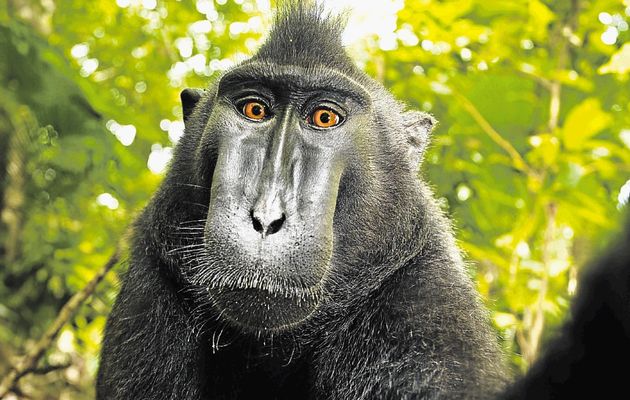Law & Politics
This Monkey Just Won the Moral Victory in the World’s Most Controversial Animal Selfie Case
PETA agrees to drop its appeal on behalf of monkey photographer.

PETA agrees to drop its appeal on behalf of monkey photographer.

Sarah Cascone

Monkey see, monkey… settle? After years of legal wrangling, People for the Ethical Treatment of Animals (PETA) and British nature photographer David Slater have finally reached a settlement in the case of the infamous “monkey selfie,” taken on Slater’s camera by a macaque named Naruto.
PETA’s latest appeal in the controversial case is being dismissed, and Slater has agreed to henceforth donate 25 percent of the gross revenue from the monkey selfie to charities dedicated to protecting the crested macaque and its habitat. Slater has not disclosed his earnings to date from the monkey selfie, but he included the image in his 2014 book Wildlife Personalities.
“PETA and David Slater agree that this case raises important, cutting-edge issues about expanding legal rights for non-human animals, a goal that they both support, and they will continue their respective work to achieve this goal,” reads a joint statement from the artist and the animal rights group.
The photograph was taken in the Tangkoko Reserve on the Indonesian island of Sulawesi. Slater arranged a camera on a tripod with a remote trigger, in the hopes that a monkey would unwittingly capture a compelling image.
The result, featuring Naturo’s toothy grin, became the world’s most litigious selfie.
Slater previously battled Wikipedia, taking them to task for reproducing the image without his consent. The online encyclopedia argued that Slater could not hold the copyright for the image since it was taken by the monkey, and the US Copyright Office ultimately agreed. In 2014, they ruled that photographs taken by animals cannot be copyrighted, saying “the office will not register works produced by nature, animals, or plants.” (Slater does hold the UK copyright.)
In their 2015 case against Slater, PETA made the bold argument in favor of Naruto’s authorship. They claimed that by publishing and selling the photographs, Slater was actually violating the monkey’s copyright.
“It was my artistry and idea to leave them to play with the camera,” Slater, who watched the entire interaction as it unfolded, told Metro back in 2011. The photographer also contested PETA’s claim that Naruto was the monkey depicted in the famous image, arguing that it was actually another, unnamed animal.
US District Judge William Orrick dismissed PETA’s initial claim in January 2016. “While Congress and the president can extend the protection of law to animals as well as humans, there is no indication that they did so in the Copyright Act,” he wrote.
PETA appealed to the 9th Circuit Court in San Francisco, and oral arguments were made in July, according to the Associated Press. The settlement brings the drawn-out litigation to a close.
“PETA’s groundbreaking case sparked a massive international discussion about the need to extend fundamental rights to animals for their own sake, not in relation to how they can be exploited by humans,” said PETA general counsel Jeff Kerr in a statement.